On behalf of NATO Association of Canada, I had the privilege to interview Paul Beckwith, climate system scientist and part-time professor in Climatology at University of Ottawa, working on his PhD in abrupt climate change. Mr. Beckwith discusses the main challenges that we are facing when it comes to climate policy, biggest environmental concerns to Canada, and geoengineering as an alternative to tackling climate change.
Please tell us a bit about your educational background and any current undertakings that you are working on.
I’m a part-time professor at the university of Ottawa, where I teach Climatology and Meteorology. I have a B.Eng. Engineering Physics degree and M.Sc. Physics degree in laser optics, a field in which I worked for many years. I’ve always been concerned with climate change and decided to formalize my knowledge by coming back to university to study and teach climate change. My research topic is abrupt climate change, which deals with how quickly the climate system is changing now, how quickly it has changed over the past, and from that information we can hopefully determine how fast it will be changing in the future.
In the context of abrupt climate change, what would you say is the biggest security threat that Canadians are facing?
I think Canadians and just about anybody else in the world is facing similar threats. I like to call it “death by a thousand cuts”. We have a fairly resilient society, cities and what we are seeing is that extreme weather events are rapidly rising and affecting our society negatively. Toronto had a big flooding in the summer of 2013, a few weeks after Calgary had one. Around the same time, Colorado had a flooding two months after. Currently, we are seeing vast portions of Louisiana under water. We also have had droughts, which threaten food security. So I see food security as being one of the main problematic issues as a result of abrupt climate change events.
It can all be related to the Arctic warming, which is quickly losing sea ice in the summer and snow cover in the spring. As a result, the Arctic is getting a lot darker, absorbing a lot more solar radiation, meaning that it’s heating up much faster that the equator. All of these things are causing more extreme weather events, and as a result because it is warmer, there is about 7% more water vapour in the atmosphere than there was in the pre-industrial levels. This is causing our resources to be used up, major damages in infrastructure and damages to people’s health
You attended the COP 21 conference in Paris, which for the first time reached an agreement requiring all nations to pledge action on climate change. However, given that there is no actual binding mechanism in international agreements, how would you rate the success of the COP 21 conference?
Paris was important and it did achieve more than previous conferences had done, but I didn’t get a sense of urgency from policy-makers and negotiations there. There was a lot of patting people on the back. The intended national contributions that countries put together will not hold us to the 1.5 or 2 degrees target. Most people say it will be more around 2.7 degrees, approaching 3 degrees, and that is if all the right commitments are made. I think that we are not meeting up to the challenges that we are getting from climate change. Look at the example of Louisiana right now, vast parts of the state are underwater and over thousands of rescues have been made. The damage to the economy and infrastructure is enormous and it’s the latest region in the climate casino. If you are very unlucky your city gets flooded out.
One alternative to tackle climate change which is currently being researched, but perhaps not enough, is geoengineering, Should we give geoengineering a chance and why is that so?
I often mention an analogy called “the three legged bar stool”. A bar stool is only stable with three legs, you take one away and it tips over. The first leg is zeroing fossil fuel emissions as fast as possible. The solution to zero fossil fuel emissions is to price carbon.
The second leg of the stool is carbon dioxide removal (CDR). We need to take carbon dioxide out of the atmosphere, as the current level is simply too high. The acidity of the oceans has increased by 30% in the last three or four decades, and this is starting to threaten the base of the food chain as a result. We need to try and get back to at least 350 parts per million.
The third leg of the stool is Solar Radiation Management (SRM). If we lose the sea ice in the Arctic this decade, which is very possible, then the warming in the Arctic will greatly accelerate because there is no more ice. This would cause sea level to rise, not to mention that the temperature gradient between the equator and the arctic will decrease greatly and extreme weather events will increase.
Do you maintain a positive outlook, when most models point to our exceeding the 2-degree target, and others point on the opposite direction, depending on which side of the political spectrum you stand?
Yes, it has become a very politicized issue. We are not heading in the right direction at all. I think we need to declare a climate change emergency. We have dying coral reefs, extreme heat waves, and extreme floods. The food supply is threatened and the oceans are acidifying. Imagine the USD $700-800 billion US military budget going to address climate change instead- to rapidly get rid of fossil fuels, to figure out ways to remove CO2 from the atmosphere, and to figure out ways such as marine cloud brightening to cool the Artic to ensure that we don’t lose the sea ice and snow cover. In order for this to happen there needs to be a large uproar amongst the general public. If we lose sea ice in the summer, that might be the tipping point in the public knowledge on the risks that we face from climate change, and that might swing governments to declare a state of emergency.
Any last message you would like to leave your audience with?
We have essentially changed the chemistry of the atmosphere and the oceans, and yet society has been very slow to recognize how serious the changes are. We need to change the way we do things. We need to get off fossil fuels, remove CO2 levels from the atmosphere, and we do have technologies that are known to work to cool off our planet. A lot of people are attributing these changes to crazy theories, so we really need to educate the public in these issues.
I would like to thank Paul Beckwith for taking the time to interview with the NATO Association of Canada, and for the insightful wisdom he has offered our readers. To learn more about Paul’s work and research visit his website.
Photo: Paul Beckwith
Disclaimer: Any views or opinions expressed in articles are solely those of the authors and do not necessarily represent the views of the NATO Association of Canada.




